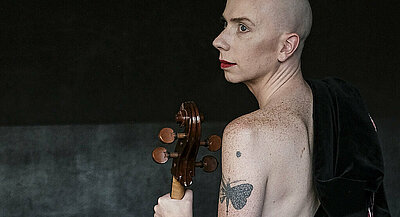Redrawing Patterns Of Exclusion
In her new work, “Too Much”, Olympia Bukkakis is looking to redefine the relation(s) between performer and audience. A report from the rehearsal process.

Text: Olympia Bukkakis
Performer
When I began performing, I had a rule that I would accept any invitation to perform. I realized that without training I was only really going to learn by doing. I ended up in absurd situations: using a fellow drag queen as an ‘oven’ at a university open day, pouring ingredients into her mouth for her to regurgitate into a muffin pan while bored and annoyed economics students pretended that they couldn’t see us as they walked past; standing anxious and unprepared in a friend’s sculptural installation, doing a frankly terrible job of ‘bringing it to life’; playing a fragile yet foul mouthed belle in a queer theatre company’s production in a friend’s garage. While the period where I accepted any and every opportunity to perform is mercifully over, my practice still bears the marks of these experiences. Because the existing drag scene in Melbourne, Australia didn’t really have room for a queen like me, I found myself performing outside traditional drag spaces. This learned familiarity of a number of genres and performance-situations, mixed with an unshakeable alienation (I was always in drag, never quite belonging to the context), meant I was able to play with the conventions and unspoken rules of the format in which I performed.
Fast forward to 2021 and my next work. “Too Much” is a study of various performance genres and how they create different relations between audience and performer. I had planned to conduct real-life research into these formats by visiting concerts, plays, dance pieces, speeches, lectures etc. This, like many plans this year, turned out to be a bit too ambitious. Sitting at home during the second and third waves I was left with my own past experiences and books. Luckily, I was able to continue ongoing discussions with the dramaturg Isabel Gatzke, as well as the drag artist Oozing Gloop. They are both ongoing collaborators working on “Too Much”.
From this research and these discussions, I’ve come to an understanding that the established rules of any performance-situation allow the participants a degree of certainty about how to come together in a certain space and time. These conventions are often unconsciously learned and repeated: the drag audience must cheer and yell encouragement at particular moments; the actor can expect that the audience of bourgeois theatre will mostly remain silent and then clap for a long time at the end; those visiting a durational installation performance can leave when they like but should stay for at least a while etc. It is this following of internalized rules that allows everyone in the situation to focus on the particular content of each work and to feel at ease with each other’s presence.
But it is also true that each of these forms functions by shutting out certain perspectives and foreclosing certain possibilities: In rural Australia, where I grew up, dance and theater were considered bourgeois activities and didn’t seem relevant to everyday life; theatre audiences in many places often feel the need to remain silent and invisible in order to follow a narrative on the stage; drag audiences have short attention spans and are often intoxicated so they cannot stand long moments of silence. These limitations also extend to who is able to take part as a performer. It has until very recently only been possible for normative genders to be portrayed on most stages. Trans performers have found little room to take part in institutionalised (and funded) performance-situations such as dance and theatre. While some grumble resentfully about the curatorial attention now being paid to queer and trans artists, the hard facts of income disparity and availability of jobs show that there is much work to be done.
In particular the question of access shone a light on this process of inclusion and exclusion in performance. Through speaking with Oozing Gloop it became clear to me that emancipatory approaches to performance cannot aim to include everyone: different people have different (and sometimes conflicting) needs. But the standard conventions of different formats often exclude along lines that are predefined by existing power relations. Bourgeois theatre excludes those who are unable to sit in silence for long periods, or who are made to feel stupid by a classist education system. By problematizing these conventions we are aiming not at an all-inclusive utopian scenario, but rather to redraw these patterns of exclusion along less traditional and/or oppressive lines. So it is intended that different parts of the audience of “Too Much” will have access to, or relate to, different parts of the piece. There will be sections in German and English, references to both living forms of (queer) community art, as well as dusty relics of the Western canon, and it will be a relaxed performance format*.
The aesthetic questions raised by this process as well as their social and political implications are of course beyond the scope of just one work. But so far, the process has been an illuminating start.
*Editorial note: A relaxed performance is adapted to suit people who find standard performances overwhelming or unpleasant; it is a performance environment without triggers like e.g. sudden noises, and where no one is expected to sit still and quiet for a long time.